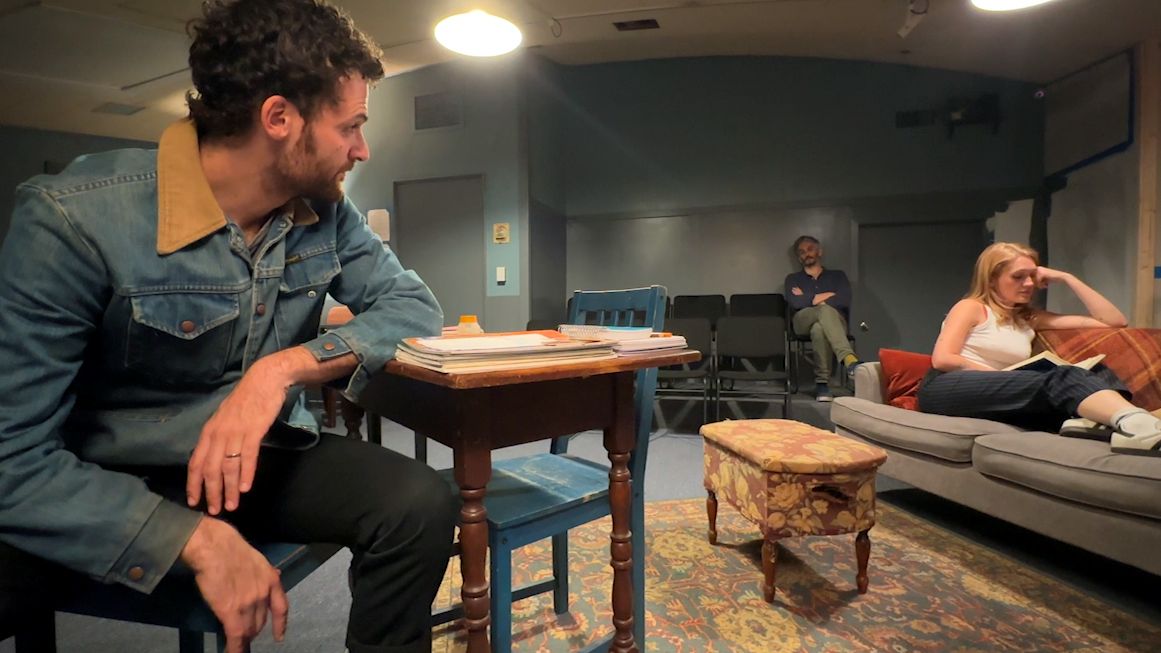LOS ANGELES — A deck of cards, a stack of pamphlets, a schedule of meetings. Even before the play begins, the space upstairs at the Matrix Theatre is already telling a story. Tim Venable’s play “Baby Foot” was previously produced in New York City, but performing it in this much more intimate in-the-round-type setting, he says, is entirely different.
“The place is revealing to us what…the play wants to be now,” Venable said.
And what it wants to be is raw, real and authentic.
Venable said he never set out to write a play about addiction, rehab and sobriety but they are topics he knows well. Addicted to drugs and alcohol, he says he hit rock bottom in 2004.
“I started a 12-step recovery and have been sober since then, which is almost 20 years,” he recalled. "It saved my life. Everything I have now in my life is a result of that.”
The characters in his play, which is set in the common room of a rehab facility, have been in the grips of the same addictions — alcohol and heroin. Hope Lauren plays Alexis, who is heading back out into the world after 90 days. Blackie, played by Daniel Dorr, is just arriving, and not necessarily of his own will.

In this intimate room, they take the audience on a journey into vulnerability and explore a topic that’s often associated with shame. And what better place to do that, Lauren said, than in the safety of a theater.
“It’s so important to put shame on a stage in front of people,” she said. “To sort of like bare your soul in that way, to give people a space to maybe examine their own shame, examine their own fears and addiction and hopefully, feel brave and a little bit less alone.”
Lauren and Dorr discussed how the conversation around mental health seems to be changing and for the better. There’s more transparency in recent years, they feel, and a movement to destigmatize asking for and receiving help. Dorr would like to see that conversation also extend to addiction since addiction and mental health are often two sides of the same coin.
“Substance abuse is something that’s rampant,” Dorr said. “All of those things are so intertwined, that I think it’s incredibly important to talk about how people are self-medicating, how they don’t have the help that they need.”
The third character in the play is Fred, a veteran of war and a veteran of the program played by Paul Deboy. Fred got clean 30 years prior to the night the story unfolds, but never left the facility, staying on and doing odd jobs, watching others come and go and sometimes come back.

“You’ll be OK,” Fred tells Alexis, assuring her that she’s done the work necessary to stay the course. “It’ll be hard, but you’ve built a foundation.”
“It’s about redemption,” DeBoy said. “It’s about hope. It’s about people helping people. And it’s just a great story to watch.”
It’s also a story that is clearly resonating with audience members, many of whom approach the cast after the show, completely open and raw.
“Almost every single show, there was someone who would come up to us crying and talking about how it really affected them,” Lauren said of the New York run. “Or they really saw themselves in one of these characters, both of these characters, or someone they love reminded them of one of these characters, both of these characters, and it was very, very moving.”
“[They] share their experience and how addiction has touched their lives,” Dorr said. “It’s incredibly validating and a reminder of why this is so important to do.”
Venable, who drew inspiration from Richard Linklater’s “Before” trilogy, sees his play not as a study of sobriety but a story of two people and of hope. Although he said there’s a tradition of anonymity baked into the 12-step program, he himself has always been very open about his sobriety and now, nearly 20 years in, he wants more than anything to be the kind of person who opens the door for someone who is struggling and tells them they are not alone.
“It’s a disease of isolation and shame,” he said of addiction, but he encourages anyone affected by it to reach out. “There are organizations, there are fellowships, there are people who want to help and you’re not alone.”
“It’s nothing to be ashamed of,” he continued. “Your addiction, your alcoholism, is not who you are. It’s a disease, and it affects a lot of people and there are people that can help and I’m one of them.”



